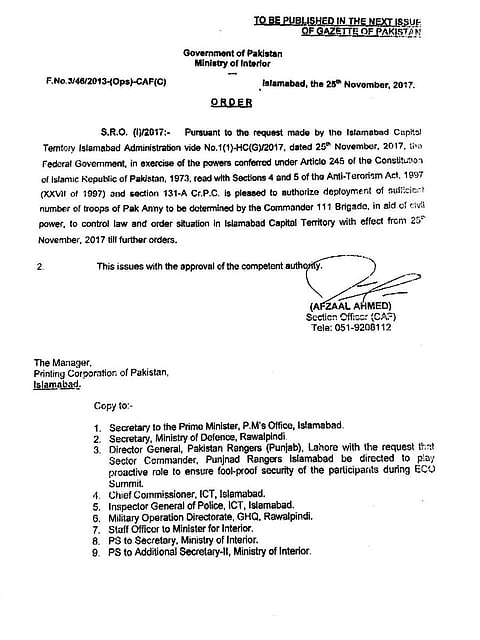The Pakistan government has called in the army after clashes broke out in Islamabad on Saturday when police and paramilitary forces cracked down on protesters from hardline religious groups who were blocking a key highway to the capital, leaving at least six people dead and injuring more than 250.
Why Is The Infamous Coup-Starting 111th Brigade Of Pakistan Army Out On Streets?
Private TV channels were taken off the air, according to a message slate that replaced the channels' programming.
The interior ministry issued a statutory regulatory order (SRO) authorising the deployment of the army in aid of the civil administration to control law and order in the Islamabad Capital Territory. The government acted under article 245 of the Constitution to deploy the army to control the situation. There were reports of protests from Rawapindi and Karachi as well.
Here’s why Pakistani cities are on the boil:
Blasphemy allegations:
Activists of Tehreek-e-Khatm-e-Nabuwwat, Tehreek-e-Labaik Ya Rasool Allah (TLY) and Sunni Tehreek Pakistan (ST) are demanding the resignation the country's law minister, Zahid Hamid, who is accused of wording an electoral law that changed a religious oath proclaiming Mohammad the last prophet of Islam to the words "I believe", a change the protesters say amounts to blasphemy.
The government has already amended the law and restored the original oath but the hardline clerics refused to call of the protests until the minister is sacked.
What is Tehreek-e-Labaik?
Tehreek-e-Labaik is one of two new ultra-religious political movements that have risen up in recent months and seem set to play a major role in elections that must be held by summer next year, though they are unlikely to win a majority.
The protesters support Khadim Hussain Rizvi, the leader of Tehreek-e-Labaik Pakistan, the hardline Islamist movement spearheading demonstrations.
The movement was formed by followers of Mumtaz Qadri, who was executed last year for shooting and killing Punjab governor Salman Taseer in 2011. Qadri allegedly killed Taseer because the governor spoke out against the country's blasphemy law, which makes insulting Islam a crime punishable by death.
As news of Qadri's death emerged, thousands of the executed man's supporters took to the streets in cities across Pakistan. They praised Qadri as a martyr who died for the cause of the Prophet Mohammed.
Since then, Tehreek-e-Labaik Pakistan has been attracting political and religious support through the country.
Crackdown on news channels, social media sites
Private television channels in Pakistan were taken off the air by the Pakistan Electronic Media Regulatory Authority, according to a message slate that replaced the channels' programming.
The authority ordered media houses to stop live coverage and temporarily suspended several channels, including Geo TV, for failing to follow the directive.
Pakistan also blocked popular social media sites, including Facebook, Twitter and YouTube, to stop protesters from uploading provocative messages.
Only state-run PTV, which has not been reporting on the protest, remained on air.
Why was the army called in?
The government was reluctant to use force, but launched the operation after the Islamabad High Court on Friday issued contempt of court notice against interior minister Ahsan Iqbal for failing to implement orders to clear the roads.
The Islamabad city magistrate issued a warning to protesters to disperse by midnight or face consequences.
What’s the order?
The statutory regulatory order (SRO)— issued in light of the request of the Islamabad Capital Territory Islamabad Administration, dated November 25, issued by the ministry under Article 245 of the Constitution, read along with Sections 4 and 5 of the Anti-Terrorism Act and section 131-A of the Cr.P.C — authorized "the deployment of sufficient number of troops" as "to be determined by the Commander 111 Brigade" in effect from November 25 until further orders.

Infamous 111th Brigade
The Brigade has been frequently involved in coups in the coutrny.
“In Islamabad, The brigade’s last major participation was in Operation Silence, in which the heads of government ordered military police, the Pakistan Army Rangers, and the 111th Brigade to surround the Red Mosque complex,” reported Daily Pakistan.
The brigade’s first involvement in toppling a government was when General Ayub Khan dismissed the government of Pakistani President Major General (retired) Iskander Mirza. In 2010, the 111th Brigade had taken over the control of Islamabad Capital Territory and provided the intense and tight security to the both Chinese Premier andPakistan’s Prime minister.
Tags